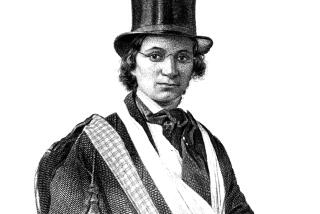Jefferson, his slave mistress and the antebellum South
- Share via
Thomas Jefferson is an American icon. Founding Father, author of the Declaration of Independence, minister to France, our first secretary of State, vice president and ultimately the third president. But it has become de rigueur to point to a necessary asterisk: that Jefferson, like all Southern aristocrats, was a slaveholder.
Irony abounds in history.
Yet Jefferson was no mere slave owner. He fathered seven children with his slave and mistress Sally Hemings.
In her important new book, “The Hemingses of Monticello,” Annette Gordon-Reed takes an expansive look at what she calls “an American family.” Rather than focusing exclusively on Jefferson and Sally Hemings, she sheds light on the Hemingses themselves, tracing the lineage back to Sally’s mother, Elizabeth.
Elizabeth, the daughter of an African woman, was the property of the Wayles family; she was “given” to Jefferson when Martha Wayles Skelton became his wife. As an example of the incestuous, convoluted nature of family relations in slave Virginia, Martha and Elizabeth’s daughter Sally were half-sisters. Martha died young, and Jefferson never married again.
Gordon-Reed is a lawyer who teaches at New York Law School; she is also a professor of history at Rutgers University. She has written about this material previously in “Thomas Jefferson and Sally Hemings: An American Controversy.”
Here she argues that while historians have paid a great deal of attention to the so-called Middle Passage -- in which slaves were shipped, in utterly inhuman conditions, from Africa to the Americas -- the story of the slaves has largely been lost to history. It’s far more instructive, she contends, to concentrate on one family as an illustration of master-slave relations among the upper-class planters in Virginia. And what better family than that of Jefferson?
When Jefferson was minister to France in the 1780s, he called for the 14-year-old Hemings to join him. She traveled with one of Jefferson’s daughters. It was probably in Paris that Jefferson and Hemings began their sexual relationship, against the backdrop of a society in which there was a black community -- most of whom were free. Ultimately, Hemings returned with Jefferson to Virginia to be with her family.
The relationship between the two was hardly clandestine. In fact, Jefferson’s political opponents used it to defame him when he ran for president. They referred to Hemings as “Dusky Sally” and “Yellow Sally,” and even “Miss Sally Jefferson.” Despite such attempts at defamation, Jefferson won the election. Although Jefferson was the father of biracial children, he looked upon African Americans as inferior to whites. He did grant freedom to some of his slaves, but generally he opposed abolition.
This is the contradiction: that slavery existed alongside the establishment of a free government for white men. Such a government was a great achievement in comparison with the European monarchies, which withheld genuine freedom from their populations. Still, when it comes to slavery, the Founders fell prey not just to contradiction but to tragedy, the repercussions of which haunt America to this day.
And yet, upon reflection, is it too controversial to say that, despite the evil of slavery, Jefferson was the product of another time? Certainly, he was not the sole slaveholder among American statesmen. This is not meant as an apologia but, rather, an unfortunate statement of fact. As pernicious as the “peculiar institution” was, Gordon-Reed is not, in her own measured way, entirely unsympathetic to Jefferson.
“The Hemingses of Monticello” is a very American story. It is prodigiously researched and makes fine use of illuminating primary sources, including extensive letters by Jefferson and slave property records. Among the most intriguing sources are the reminiscences of Isaac Jefferson, a slave who shared his memories of the Hemings family in 1847, 21 years after Jefferson’s death.
Gordon-Reed has a fluid writing style, especially with dense material. However, her book requires patience. It is not a popular history in the vein of David McCullough or Doris Kearns Goodwin.
Nonetheless, the exposure she gives to this revelatory American story provides some much needed insight into Southern antebellum life and the various contradictions involving the views and behavior of slave masters and their relations to their slaves.
--
More to Read
Sign up for our Book Club newsletter
Get the latest news, events and more from the Los Angeles Times Book Club, and help us get L.A. reading and talking.
You may occasionally receive promotional content from the Los Angeles Times.










